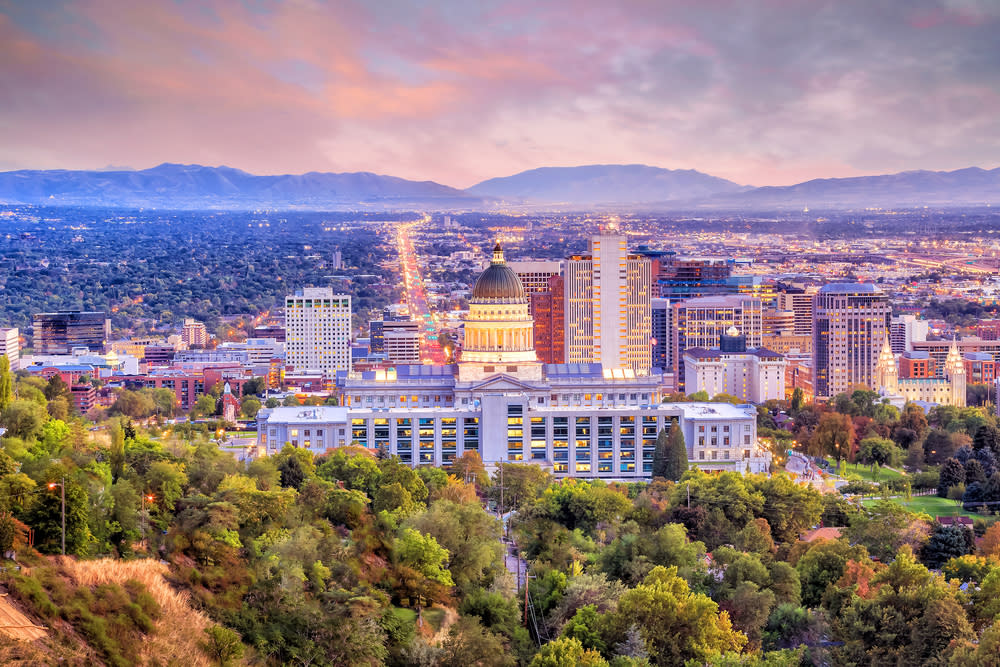More from Salt Lake City
Main Menu
- 00:00
- 06:00
- 12:00
- 18:00
- 23:00
Salt Lake City : Next 24-Hour Weather
Tomorrow - 27th January 2026
Sunrise 07:42
Sunset 17:39
Tomorrow - 28th January 2026
Sunrise 07:42
Sunset 17:39
Holiday Weather Now
Sorted by popularity:
Updated at 02:00 GMT
-
Temp feels like3°C37°F
-
Length of day09h 57m
-
Pressure30" (1028 hpa)
-
Visibility16 km (9miles)
-
Wind speed4 km/h
Sunrise 07:42
Sunset 17:39
-
Temp feels like:
3ºC (37 ºF)
-
Length of day:
09h 57m
-
Pressure:
30" (1028 hpa)
-
Visibility:
9 miles (16 km)
-
Wind speed:
4 km/h
Salt Lake City (also known as Salt Lake or SLC) has a cold semi-arid climate which typically entails hot, sunny summers and chilly winters with a distinct possibility of rain and snow, especially given SLCâs high elevation (about 4,327 feet). While extreme weather is rather rare, snow has fallen in the city as early in the year as September and as late as May due to the storms that blow into Utah from the Pacific.
The city sometimes experiences heavier drifts due to the addition of âlake-effect snowâ from the nearby Great Salt Lake. Lake-effect snow occurs when cold winds pick up water vapour from the surface of a large body of water, freeze it and deposit it as snowfall.
Another aspect of a cold semi-arid climate is the chance of significant temperature fluctuation (sometimes of over 20°C) within a 24 hour timeframe, which means it is best to check a forecast to know whether to pack a mackintosh or a mankini for your vacation.
Because the nearby Wasatch Mountains catch most of the snow that would otherwise fall on the city, SLC has developed a booming skiing industry. This also led to Salt Lake being selected to host the Winter Olympics in 2002.
The Great Salt Lake itself is also responsible for an occasional olfactory essence affectionately known as âLake Stinkâ, which can be carried towards the city by the wind. Lake Stink occurs when the rotten gases trapped by salt brine at the bottom of the lake are disturbed and rise to the surface. This happens several times a year and the direction of the wind determines who it will affect.
Summer
Unlike spring, which is the wettest season, summer in Salt Lake City tends to see very little precipitation, low humidity and lots of bright sunshine (around 12 hours at the height of the season) which is great for sunbathing on holiday.
In June, July and August the minimum average temperatures are 56°F, 63°F and 62°F respectively. The average highest temperatures for the same period are 82°F, 91°F and 89°F. This would seem to indicate that the hottest month is usually July and, despite the huge seasonal temperature variation between summer and winte, the normal summer temperature in SLC is fairly similar to Malaga in Spain.
Winter
During winter Salt Lake experiences a big drop in temperature with the typical low temperatures in November, December and January sinking to 30°F, 22°F and 21°F respectively. The usual high temperatures for those months are 49°F, 38°F and 37°F; so, even in the most clement winter, itâs best to pack the thermal vest.
Rain is more frequent in winter (though, again there isnât as much as in spring) with around 6-7 days of downpour per month. The snowfall tends to be heaviest during December and January when there are usually 8-9 days, however the snow rarely sticks for long in the city. Up at the nearby ski resorts in the mountains the snow often reaches depths of 500inches and is hailed by some ski enthusiasts as the best powder snow in the world due its dryness (which is a result of being inland and close to a large lake).
If youâre planning a skiing trip it may be worth bearing in mind that there are only about 4-5 hours of direct sunshine in winter (although there are still around 10 hours of daylight) so it may be slightly trickier to see where youâre going!

















